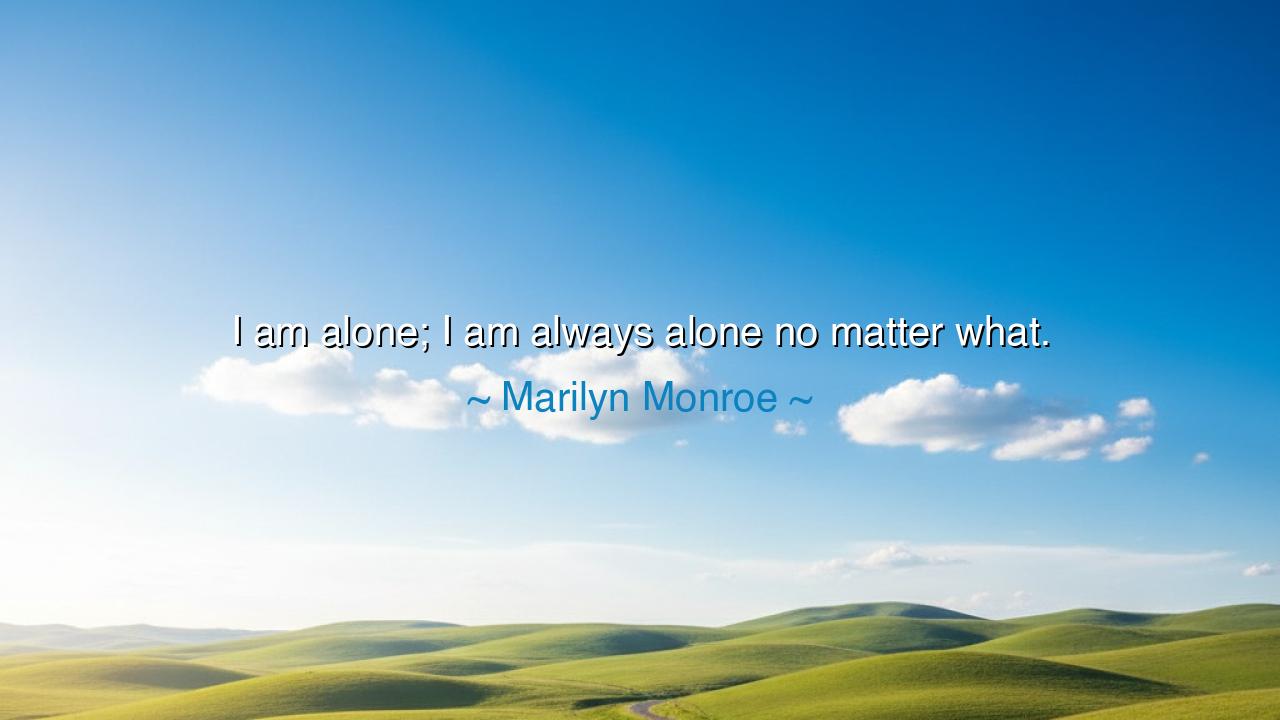
I am alone; I am always alone no matter what.






When Marilyn Monroe said, “I am alone; I am always alone no matter what,” she was not speaking as the glittering star adored by millions, but as the woman behind the myth — the soul veiled beneath fame’s bright illusion. Her words rise from a place deeper than sorrow, from that ancient and eternal solitude which touches every human heart, no matter how many eyes behold it or how many voices call its name. In this confession, we hear the echo of a universal truth: that loneliness is not the absence of people, but the absence of understanding, and that even amidst the crowd, a soul may stand utterly alone.
Marilyn Monroe, born Norma Jeane Mortenson, lived a life that seemed the very embodiment of light and adoration. Yet beneath the laughter and the beauty, she carried the shadow of abandonment and longing. Her childhood was marked by instability, her youth by exploitation, and her fame by isolation. The world worshiped her image, but few ever reached the woman within. When she said, “I am always alone,” she spoke as one who had learned that adoration is not the same as love, and that the world’s applause cannot silence the ache of the unseen self. Her words are not simply the lament of a star, but the cry of the human condition itself — the soul’s awareness that even in connection, there exists an irreducible solitude.
The ancients, too, knew this loneliness. Marcus Aurelius, the philosopher-emperor, surrounded by courtiers and armies, wrote of feeling “a stranger in the world,” despite being the most powerful man on earth. Buddha, though loved by disciples, walked alone into the forest to confront the silence of existence. And even Christ, on the night of his trial, prayed in solitude while his followers slept. The loneliness Monroe spoke of is thus not merely personal — it is cosmic. It is the solitude of consciousness itself, that awareness that no one can truly inhabit another’s soul, that each of us must walk the inner road alone.
But within her lament also lies a tragic wisdom. To say “I am always alone” is to recognize the boundary between the self and the world — the truth that all love, all connection, must bridge that sacred distance. Monroe’s pain came not only from loneliness itself, but from the illusion that fame could end it. She stood upon the summit of worldly success and found that it offered no shelter from the winds of emptiness. In this way, her life becomes a parable: when we seek belonging in admiration rather than authenticity, in image rather than intimacy, we are destined to feel alone, even in the midst of devotion.
And yet, solitude is not only suffering — it is also the forge of the soul. The same loneliness that broke her also made her luminous. It was from her isolation that Monroe drew her tenderness, her depth, her unguarded humanity. For solitude, when embraced rather than feared, becomes the temple of self-knowledge. The great artists, poets, and thinkers — from Van Gogh to Emily Dickinson — have all known this: that one must pass through loneliness to reach the deeper communion of truth. Monroe’s tragedy was not that she was alone, but that she lived in a world that would not allow her to transform that loneliness into peace.
Let this be the lesson, then, that her words pass down to us: do not fear your aloneness. The world will promise to fill it with distractions, with admiration, with endless noise — but none of these can reach the place where the soul waits for its own understanding. Instead, enter your solitude as one enters a sacred chamber. Learn to sit with yourself, to know your own depths, to hear your own heart without judgment or escape. For only those who have learned to stand alone can truly love another, and only those who have met their own silence can speak words of truth.
And remember always the wisdom behind Marilyn Monroe’s sorrow: “I am alone; I am always alone no matter what.” It is not a curse, but a mirror — reflecting both the pain and the possibility of being human. Each of us is alone in our soul, yes — but in that aloneness lies our freedom, our strength, and our capacity for compassion. When you accept your solitude, it ceases to wound you. It becomes your teacher, your companion, your truth. And from that sacred stillness within, you will find that though you are alone, you are also, somehow, part of everything — and in that paradox, the soul is finally at peace.






AAdministratorAdministrator
Welcome, honored guests. Please leave a comment, we will respond soon